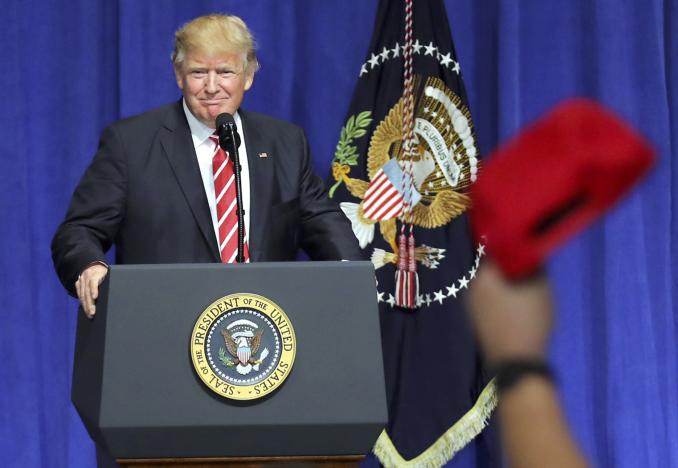
Promoting U.S. exports and the expansion of American business into new markets creates jobs at home and supports development and stability abroad. Unfortunately, rather than making it easier to take advantage of opportunities in emerging markets, the Trump budget will make it even harder for American companies to compete in the global marketplace.
When American companies look at opportunities in emerging markets, particularly those in sub-Saharan Africa, Latin America or the Caribbean, they first consider access to finance, political risk, human capital, infrastructure and security. The White House’s proposed budget would make overcoming every one of those obstacles more difficult.
The budget blueprint the Trump administration introduced last week would make life much more difficult for American companies abroad. While it’s not yet clear precisely where many of the proposed cuts would come from, or if they’ll even happen, the blueprint is a clear indication of the administration’s priorities and its lack of understanding of what U.S. businesses need to be competitive.
Access to Finance: The Trump budget proposes to eliminate funding for 19 agencies, including the Overseas Private Investment Corporation (OPIC). As the U.S. government’s development finance institution, OPIC helps American businesses enter emerging markets by providing financing, expressly in cases where private funding is not available. It operates on a self-sustaining basis at no net cost to American taxpayers and has generated money for the U.S. Treasury for 39 straight years, so eliminating OPIC would actually create a budget shortfall.
China, India, Brazil, and many other countries have state-owned entities that provide project financing and guarantees in emerging markets. OPIC involvement requires U.S. ownership or strong U.S. involvement. To deny U.S. companies similar support would be putting them at a distinct disadvantage in a very competitive marketplace.
Political Risk: The budget also seeks $2.2 billion for new embassy construction and maintenance, while cutting the overall State Department, USAID, Treasury International Programmes budget by 28 percent ($10.1 billion). Higher Embassy walls and fewer staff will only serve to close off markets to American businesses.
One of the best tools American companies have when entering emerging markets is a knowledgeable, responsive staff at the U.S. Embassy in country, as well as the experts at the State, Commerce and Treasury Departments in Washington. They provide companies useful information on investment climates, facilitate meetings and advise on regulatory environments. The presence of these professionals also serves to promote U.S. values and an appreciation for American products and services. Having a capable, engaging Embassy in country to turn to, both in good times and bad, is crucial to American companies in emerging markets.
Human Capital: The ability to hire locally is an important consideration for any company. It is not only more cost effective than transplanting ex-patriots, but local hires provide additional value in terms of knowledge and experience that can help businesses operate in a foreign environment. U.S. programmes that provide training and educational opportunities through USAID, the Peace Corps, etc. are vital to building the human capital that will benefit U.S. companies in emerging markets.
Infrastructure: The top constraint to economic growth in emerging economies is often an infrastructure deficit. Without reliable power, passable roads, or a robust telecommunication system, businesses cannot hope to succeed in these markets. The U.S. has sought to address these challenges through programmes like the Millennium Challenge Corporation (MCC), USAID’s Power Africa Initiative, and the U.S. Trade and Development Agency (USTDA). All of which will face significant cuts or outright elimination if the Trump budget blueprint were to be implemented.
Security: For most American companies, the safety and security of their employees is a paramount concern. This is even more pronounced when operating in emerging markets. While the Trump budget proposes a $54 billion increase for the Department of Defense, it also “shifts some foreign military assistance from grants to loans” and “refocuses economic and development assistance to countries of greatest strategic importance to the U.S.”
Limiting U.S. assistance to those countries with which strong ties already exists will prevent new, valuable partnerships from being developed. In addition, reducing support for security cooperation programmes that improve the military and police in emerging countries will only serve to undermine the stability of those countries and make doing business there much more difficult.
American companies are already at a disadvantage when attempting to do business abroad. They’re held to a higher standard when it comes to financial disclosures, hiring practices, and engaging with host governments. Often for good reason. They’re also competing against state-owned entities and companies that have the support of large, state funded financing mechanisms.
Promoting U.S. exports and the expansion of American business into new markets creates jobs at home and supports development and stability abroad. Unfortunately, rather than making it easier to take advantage of opportunities in emerging markets, the Trump budget will make it even harder for American companies to compete in the global marketplace.
Chris Beatty is managing director of KRL International, a firm that advises governments and companies on political, economic and security risk mitigation. Follow him on Twitter @C_Beatty.
Originally published on CNBC.
END

Be the first to comment